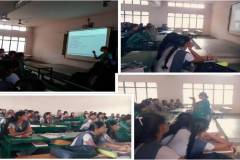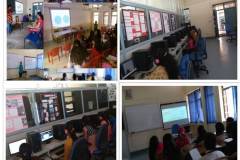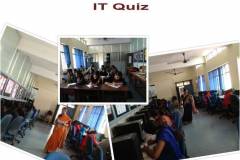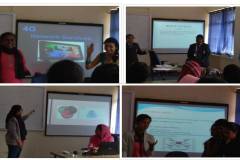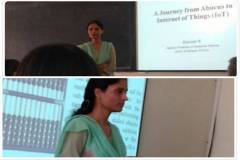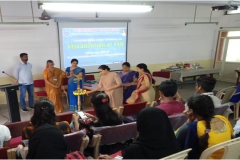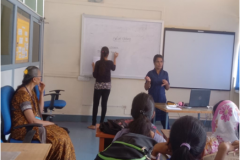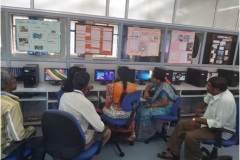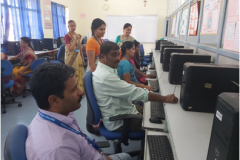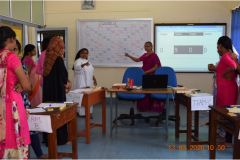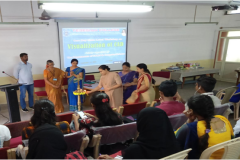- Established in the year 1996.
- The spacious classroom is equipped with Smartboard and ICT facility.
- Presently all Comptuers in the lab are connected by LAN and networked with other computers in the campus and
- Wi-Fi connectivity is available to the department
- All PCs of Computer lab have broadband internet connectivity.
Syllabus
Courses offered
BSc. in Compter Science
Physics ,Mathematics,Computer Science
Computer Science,Mathematics,Statistics
Programme Outcomes
Scientific knowledge: Apply the knowledge of mathematics, science, and computing to the solution of complex scientific problems.
Problem analysis: Identify, formulate and analyze complex scientific problems reaching substantiated conclusions
Design/development of solutions: Design solutions for complex problems and design system components or processes that meet the specified needs
Modern tools usage: Create, select, and apply appropriate techniques, resources, and modern computing and IT tools including prediction and modeling to complex scientific activities with an understanding of the limitations
Course outcome
Computer Concepts and C Programming
- Bridge the fundamental concepts of computers with the present level of knowledge of the students.
- Familiarise operating systems, programming languages, peripheral devices, networking, multimedia and internet
- Understand binary, hexadecimal and octal number systems and their arithmetic.
- Understand how logic circuits and Boolean algebra forms as the basics of digital computer.
- Demonstrate the building up of Sequential and combinational logic from basic gates.
- Know the basic components of the computer and working of each device.
- Understand the representation of data in computer.
- Know the difference between Assembly and High level programming Languages.
- Design Algorithms and Flowcharts
- Understand the functions of Operating System
- Understand the fundamentals of C programming.
- Choose the loops and decision making statements to solve the problem.
- Implement different Operations on arrays.
- Use functions to solve the given problem.
- Understand pointers, structures and unions.
- Implement file Operations in C programming for a given application
Data Structures (DS)
- Student will be able to choose appropriate data structure as applied to specified problem definition.
- Student will be able to handle operations like searching, insertion, deletion, traversing mechanism etc. on various data structures.
- Students will be able to apply concepts learned in various domains like DBMS, compiler construction etc.
- Students will be able to use linear and non-linear data structures like stacks, queues , linked list etc.
Database Management Systems
- The learner will be able to describe data models and schemas in DBMS
- To understand the features of database management systems and Relational database.
- To use SQL- the standard language of relational databases.
- To understand the functional dependencies and design of the database.
- To understand the concept of Transaction and Query processing.
Design and Analysis of Algorithms Course Outcomes:
- Ability to analyze the performance of algorithms.
- Ability to choose appropriate algorithm design techniques for solving problems.
- Ability to understand how the choice of data structures and the algorithm design methods impact the performance of programs.
- To clear up troubles the usage of set of rules design methods
Data Communication and Computer Networks Course Outcomes:
- Students should be understand and explore the basics of Computer Networks and Various Protocols. Student will be in a position to understand the World Wide Web concepts.
- Students will be in a position to administrate a network and flow of information further he/she can understand easily the concepts of network security, Mobile and ad hoc networks.
- Able to introduce the fundamental various types of laptop networks.
- Get introduce with demonstration of the TCP/IP and OSI fashions with merits and demerits.
- Awarded with the knowledge to explore the various layers of OSI model.
Operating Systems
- The role of operating system as System software.
- Compare the various algorithms and comment about performance of various algorithms used for management of memory, CPU scheduling, File handling and I/O operations.
- Apply various concept related with Deadlock to solve problems related with Resources allocation, after checking system in Safe state or not.
- To appreciate role of Process synchronization towards increasing throughput of system.
- Describe the various Data Structures and algorithms used by Different OS.
Object-Oriented programming with C++
- Understand the features of C++ supporting object oriented programming
- Understand the relative merits of C++ as an object oriented programming language
- Understand how to apply the major object-oriented concepts to implement object oriented programs in C++, encapsulation, inheritance and polymorphism
- Understand advanced features of C++ specifically stream I/O, templates and operator overloading
Web Designing with html
- Be able to use the HTML programming language
- Resolves written HTML codes.
- Runs the page designed using HTML code
Computer network
- Describe the functions of each layer in OSI and TCP/IP model.
- Explain the functions of Application layer and Presentation layer paradigms and Protocols.
- Describe the Session layer design issues and Transport layer services.
- Classify the routing protocols and analyze how to assign the IP addresses for the given network.
- Describe the functions of data link layer and explain the protocols.
- Explain the types of transmission media with real time applications
Numerical Algorithms and Operation Research.
- On completion of this module the learner should be able to:
Apply appropriate algorithms to solve selected problems, both manually and by writing computer programs - Compare different algorithms with respect to accuracy and efficiency of solution.
- Analyze the errors obtained in the numerical solution of problems.
- Using appropriate numerical methods, determine the solutions to given non-linear equations.
- Using appropriate numerical methods, determine approximate solutions to systems of linear equations.
- Using appropriate numerical methods, determine approximate solutions to ordinary differential equations.
- Demonstrate the use of interpolation methods to find intermediate values in given graphical and/or tabulated data.
- Be able to understand the characteristics of different types of decision-making environments and the appropriate decision making approaches and tools to be used in each type.
- Be able to build and solve Transportation Models and Assignment Models.
ASP.NET Learning outcomes:
- At the end of the course the participant will Create a Web form with server controls.
- Separate page code from content by using code-behind pages, page controls, and components.
- Debug ASP.NET page.
- Creating Web Forms
- Adding ASP.NET Code to a Page
- Handling Page Events
Object Oriented Programming with JAVA
- Implement Object Oriented programming concept using basic syntax of control Structures, strings and function for developing skills of logic building activity.
- Identify classes, objects, members of a class and the relationships among them needed for a finding the solution to specific problem
- Demonstrates how to achieve reusability using inheritance, interfaces and packages and describes faster application development can be achieved.
- Demonstrate understanding and use of different exception handling mechanisms and concept of multithreading for robust faster and efficient application development.
- Identify and describe common abstract user interface components to design GUI in Java using Applet & AWT along with response to events
Certificate course
Certificate course on “Computer fundamentals and web designing “
I would like to extend my warmest welcome to the department of Computer Science, Teresian College Mysore, and Karnataka. If you are interested in a programming, you can start your career here. The department has a team of experienced and motivated faculty members who are in practice of tuning the young minds to lead them to globally competitive. The department is dedicated to impart quality education and producing highly skilled graduates. The department follows the curriculum of university of Mysore. The department has well equipped classrooms with ICT enabled learning technologies. Over the years many of our students are placed in different IT companies. We focuses on the development of the students by a combination of both curricular and extracurricular activities and we always keep a strong teacher student bond for effective learning.
Vision
To be a stepping stone of the future innovative programmers in the field of Computer Science.
Mission
- To empower the students with the required skills to solve the complex technological problems
- Provide a learning ambience to enhance innovations, provide computer science education and training to students in other departments
- Provide leadership qualities, team-spirit and ethical responsibilities.
Name : Mrs. Princy Joy
Designation : Assistant professor & HOD
Qualification : M.Sc,.
Year of Joining : 2006
Experience : 12 Years
Name : Mrs. Devika, M. N.
Designation : Assistant professor
Qualification : M.Sc IT
Year of Joining : 2014
Experience : 24 Years
Name : Ms.Shwetha Bai M.
Designation : Assistant professor
Qualification : M.Sc,.
Year of Joining : 2021
Experience : 1 Year
- Thejaswini M and Ms. Diana Sandra of II BSc won first prize in Inter college Quiz competition held on September 29th 2017 at Gopalswamy College for professional studies, Mysore
Mrs. Princy Joy
Assistant Professor & HOD
Department of Computer Science
Teresian College,
Siddarthanagar,
Mysuru - 570011.
Mob : +91 99002 83900
E-Mail : princyjoy@gmail.com


